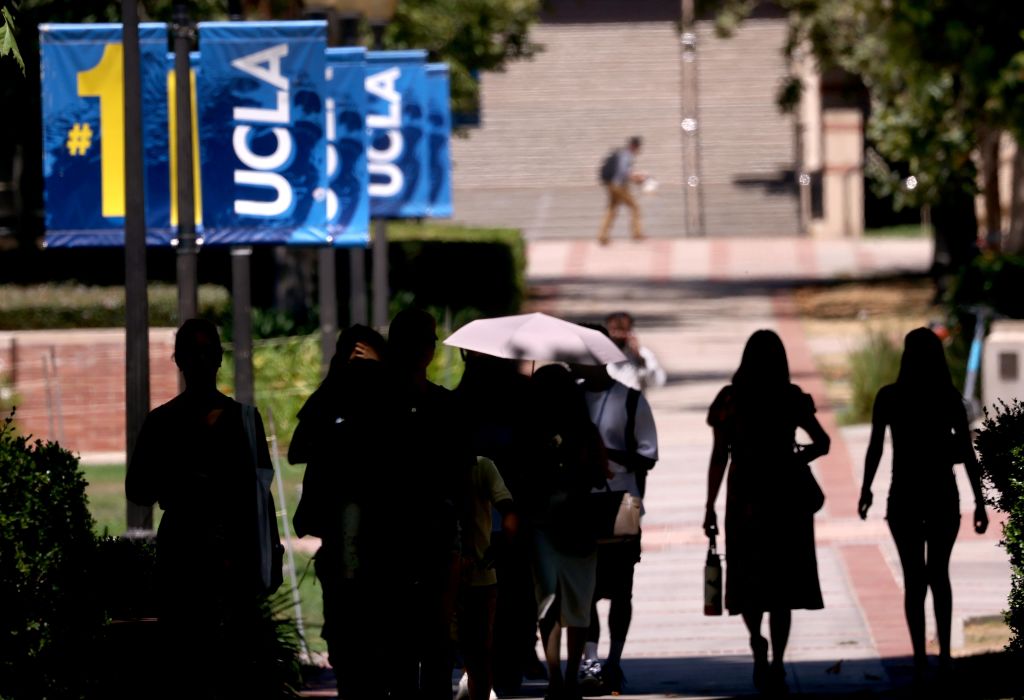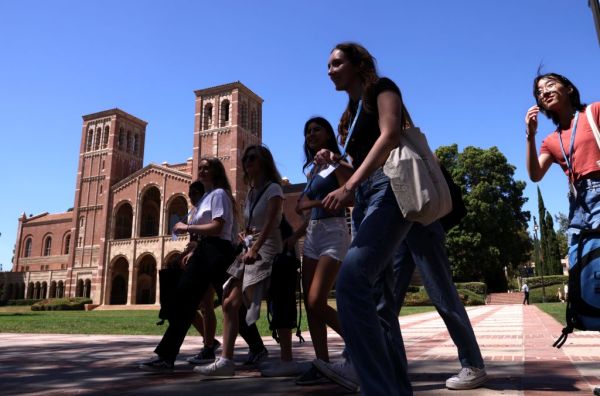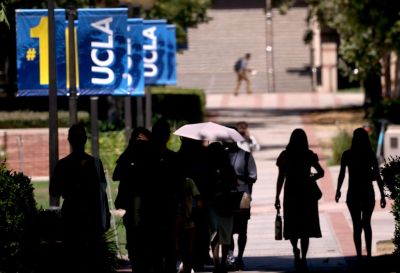Back in February, Democratic Rep. Derek Kilmer was supposed to give a lecture on toxic polarization in American discourse at the University of Puget Sound. He didn’t. The event was canceled after pro-Palestinian protesters forced themselves into the lecture hall and stormed the stage.
That same month, Israeli Defense Forces reservist and lawyer Ran Bar-Yoshafat was supposed to speak on the geopolitical dynamics of Israel’s war in Gaza at the University of California–Berkeley. He didn’t. The event was canceled after hundreds of angry protesters surrounded the venue, broke glass doors, obstructed entryways, and forced themselves into the building.
That same day, Jeffrey Blutinger was supposed to give a guest lecture at San Jose State University titled “Constructing a Just Solution: Where Israelis and Palestinians Go from Here.” He didn’t. The event was canceled because of violent pro-Palestinian protests, and Blutinger was escorted off campus by police.
These are just a few examples of the violent deplatforming of speakers that has become commonplace on college campuses. Deplatforming often takes the form of a heckler’s veto—disrupting a speech or event in progress and forcing it to conclude early—or having speakers disinvited from campus speeches or commencement ceremonies. But it can also take the form of canceling performances of concerts, plays, or the screenings of movies, or having controversial artwork removed from public display.
There have been plenty more examples already this academic year. Speakers at Brooklyn College, Johns Hopkins, Indiana State, the University of Minnesota, and the University of Washington have already suffered from this rising illiberal trend.
And it is rising.
In the last decade we have seen more than 1,000 campaigns to get professors punished for their First Amendment-protected speech. Nearly two-thirds of those campaigns succeeded, and almost 200 professors ended up being fired or forced out. For perspective, during McCarthyism, about 60 communist professors were fired, and about 100 professors were fired for political belief overall. We know this is a wild underestimate, given that about 1 in 6 professors say that they have been punished or threatened with punishment for their speech, teaching, or research. To give further perspective, if extrapolated nationally that would be about a hundred thousand professors targeted for speech. There is no parallel to that in American history.
The targeting of professors, which began to increase around 2015 and accelerated in 2017, would reach its high watermarks in 2020, 2021, and 2022, but began to decline somewhat in 2023. However, we began to see a dramatic increase in attempts to deplatform invited speakers on campus. In fact, 2023 is the worst year on record for deplatforming, with a record-setting 145 total attempts and 75 successes. However, 2024 is on track to beat it. As of November 1, my organization, the Foundation for Individual Rights and Expression, has already logged 136 attempts in our Campus Deplatforming Database for 2024, and there are still two months to go before the end of the year.
Our institutions of higher learning have done this to themselves. As Tyler Austin Harper put it in a piece for The Atlantic, higher education created this problem by favoring applicants who are interested only, or primarily, in engaging in activism. Indeed, they made activism a part of their marketing and recruitment materials. Campus tours often include stops at sites of important protests, such as Columbia University’s Hamilton Hall, which was broken into and occupied by Vietnam anti-war protesters in 1968 and again by pro-Palestinian protesters in 2024. Students are attracted to Columbia by its history of activism, and mirrored the actions of protesters in 1968 to symbolically link the two movements. And it's not just elite colleges. Ohio State, for example, emphasizes its scholarships and opportunities for students interested in social justice activism, as do countless schools around the country.
Activism is an important part of free speech and public participation. My organization and I go to great lengths to protect and defend it. But by explicitly recruiting activists, and by creating an academic environment that encourages activism, our universities have forgotten the importance and the value of a scholarly mindset.
Right now, many students enroll with a predetermined moral and political certainty and an intolerance for dissent—and schools largely encourage and reinforce it. Indeed, there isn’t much difference between asking students how determined of an activist they are and asking them how many issues they consider essentially settled. And given the fact that modern social justice activism tends to combine disparate causes into one larger intersectional whole, being a social justice activist can mean that you are certain on an awful lot of moral, historical, philosophical, and even scientific issues. This plague of certainty is why we’re seeing an explicit rejection of free speech, academic freedom, and free inquiry in the very places that are meant to be strongholds for them.
Our institutions of higher education should protect their activists, but they should also prioritize recruiting scholars. The ideal student should think more like a field anthropologist, someone who is trying to figure out where the other side is coming from, rather than a strident warrior in a battle of good versus evil. That open, curious, intellectually humble, and receptive mindset is the foundation of actual learning, and is critical to fostering an educational environment that lives up to its intended purpose.
This attitude, if adopted, would effectively eliminate the notion of disinviting or deplatforming speakers on campus. Even when it’s right-wing activists like Charlie Kirk and Ann Coulter, Palestinian writer Mohammed el-Kurd, or any other speaker with controversial views, the scholarly student would welcome the opportunity to hear their arguments and become better informed about what others think on issues that matter most. A scholarly mindset understands that we are not safer from the world for knowing less about what people actually think.
While the situation on campus is terrible, there is cause for some cautious optimism. Despite a shoddy past record, schools can—and sometimes do—change for the better. This year, Dartmouth became the only ivy league school to earn a “green light” rating from FIRE, which we award to institutions with no written policies that seriously imperil student free speech rights. This is largely the result of Dartmouth’s new president Sian Beilock, who took office in 2023 and committed to preserving free expression on campus. The school also recently announced the expansion of its free expression program, which is aimed at reducing disruptions and deplatforming incidents at events.
Similarly, the University of South Carolina didn’t back down last month when other universities would have surely caved. Amid a chorus of calls, including from the NAACP, to cancel a "comedy roast" of Kamala Harris hosted by Proud Boys founder Gavin McInnes and Breitbart editor Milo Yiannopoulos, the school held strong to its commitment to First Amendment principles.
This is what the First Amendment requires, but it’s also what the scholarly mindset tolerates in a way the activist mindset cannot.
Still, there’s much more work to be done. The danger is that a lot of campuses are just going to create superficial solutions to satisfy the current moment without actually addressing the root problem of intellectual and moral certainty among their student body. Indeed, all the incentives for most colleges is to do the absolute minimum to placate angry alumni and donors. But the entire higher education sector should be taking a long hard look at itself and start from the very beginning—up to and including how they seek out and admit students—to make a lasting change.
That starts even before the student recruitment process. Our colleges and universities for too long have taken positions on issues that are outside the scope of their missions and would benefit from adopting and adhering to the principle of institutional neutrality. Admitted students often participate in a summer orientation program before moving on campus. Universities should revamp and create orientation programming geared toward educating those incoming students on free speech principles, encouraging them to value dialogue across differences as a critical aspect of learning and growth.
It is also imperative that schools punish students who violate these principles on campus. Anyone who disrupts speeches should be disciplined. Anyone who tries to get speakers canceled should be loudly opposed. And anyone who engages in violence should be expelled.
Recruiting students focused on academics more than activism is important. But schools should prioritize free speech values in hiring. They must implement robust training for administrators, resident advisers, and student government members in the radical open-mindedness and intellectual humility of the scholarly mindset. Free speech is a core democratic right, an essential component of a good society, and the foundation of a university’s truth-seeking mission—and those who represent the university need to have a deep and rich understanding and appreciation of these facts.
There must also be consequences for administrators failing to uphold these principles. Shout downs or disruptions warrant independent investigations to determine the roles administrators played in the chaos. Those who do nothing to prevent or stop such heckler’s vetos should be punished. Those who encouraged or enabled such behavior should be fired. Given how much of the increase in per-student spending in contemporary higher education is due to the growth of the bureaucratic class, this should be seen as a much-needed opportunity to de-bureaucratize—starting with the administrators who pose the biggest threat to the marketplace of ideas.
Refocusing the climate of higher education to one that actually opposes orthodoxies, oversimplifications, and unwarranted certainty would be a radical change—one that challenges many of our natural human impulses. Embracing the truth-seeking function of higher education requires thinking in a way that's very different from the way humans are prone to think. Even the things that feel most intuitive and obvious still have to be tested and challenged through experimentation, counterfactuals, and devil’s advocacy.
That’s a tall order, but chipping away at falsity and striving toward the truth is the point of higher education.
To change this paradigm on campus requires a profoundly different approach and psychology than these schools are currently teaching students. Leaning into the process of truth-seeking can be thorny and often painful, but it’s also worthwhile and necessary. It means letting the facts lead you rather than imposing your preconceived notions onto your fellow students, your professors, or the world around you.
However difficult it might be for universities to reestablish these norms after decades of encouraging the opposite, failing to do so will have dire consequences. Our institutions will be little more than dogma factories, churning out wave after wave of activists and leaving us with no scholars, no thinkers, and no higher learning at all.






Please note that we at The Dispatch hold ourselves, our work, and our commenters to a higher standard than other places on the internet. We welcome comments that foster genuine debate or discussion—including comments critical of us or our work—but responses that include ad hominem attacks on fellow Dispatch members or are intended to stoke fear and anger may be moderated.
With your membership, you only have the ability to comment on The Morning Dispatch articles. Consider upgrading to join the conversation everywhere.